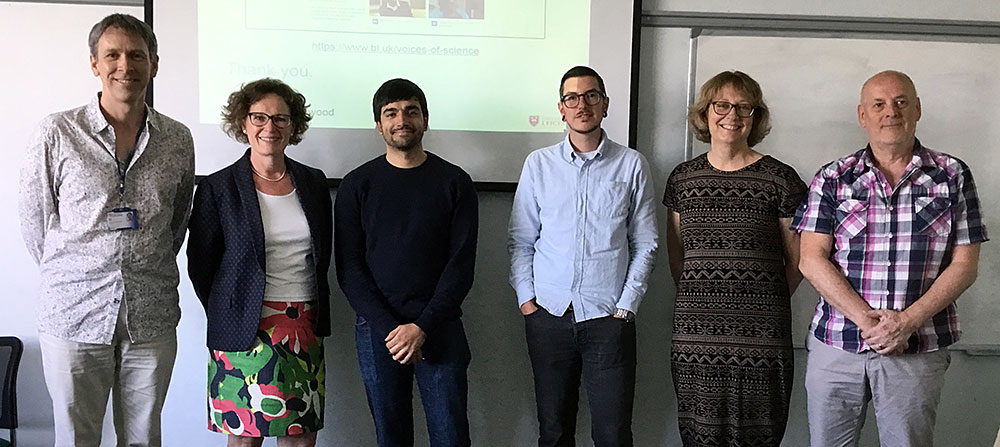![[East Midlands Oral History Archive logo]](../images/logo.gif) |
EMOHA Oral History Day 2018 |
||
|
|
|||
The 2018 East Midlands Oral History Day featured postgraduate work at the University of Leicester.
The East Midlands Oral History Day 2018 took place on the 4th floor of the Charles Wilson Building, in the Rutland & Gartree Rooms (SR 403 & 404) at the University of Leicester, University Road, Leicester LE1 7RH on 22nd June, 10am–2pm. This event was organised by the East Midlands Oral History Archive (EMOHA) at the University of Leicester, with support from the Oral History Society.
Timetable
10.00 |
Tea/coffee/welcome - Colin Hyde (EMOHA) and Cynthia Brown (OHS).
|
10.15-10.45 |
Liam McCarthy - ‘I thought I was the only one’: Introducing GI children in Leicester to each other. There is an established history of American GIs in Leicester in the Second World War and GI Brides. But there is a hidden history of racism, violence and sex which left behind hundreds of GI babies in Leicester after the war. Many thought they were the only one until I tracked some of them down and introduced them to each other to share their stories.
|
10.50-11.20 |
Amerdeep Panesar - Cricket and the British Asian Community: The story of cricket from the grassroots. Since the 1960s Asians have been a key part of cricket in England to the extent that the England and Wales Cricket Board have stated that South Asians currently account for over 30% of recreational cricketers. This presentation is a short introduction to this story as told by the players.
|
11.25-11.55 |
Sue Bishop - From Enemy Prisoner of War to ‘German Friendly Alien’: Memories of Life in Leicestershire and Rutland between 1945-1949. After the final German Prisoners of War (PoWs) held in Great Britain after World War Two were released in 1948, over 25,000 men managed to meet the government’s criteria to remain as 'foreign aliens' rather than be repatriated. The memories of ex-PoWs, their wives and children, and those who employed them, help to uncover how the men secured the opportunity to stay and what those early years were like for them as they tried to settle into their new way of life.
|
12.00-12.10 |
Break for leg stretch and re-fills |
12.10-12.40 |
Benjamin Palmer – A Fruitful Field for Women: British Women Biochemists 1945-1975. Whilst women are underrepresented in all areas of science, this discrepancy is least in biological sciences and subjects allied to medicine. Biochemistry has held a particularly prominent position in the history of women in 20th-century science. The first British woman to be awarded a Nobel Prize was a biochemist, and one of the first women elected Fellowship of the Royal Society was a biochemist. Relevant literature proposes several theories and assumptions regarding the differing patterns of discipline choice of women scientists. In this talk, I utilise women’s own reflections of their careers to assess the validity of theories around the prominence of women in biochemistry and related fields.
|
12.45-13.15 |
Emmeline Ledgerwood - The 1968 Fulton Report: civil service reform and government scientists. Drawing on An Oral History of British Science and Emmeline's own interviews, this talk will discuss how recommendations made 50 years ago to restructure the civil service marked a change in the way government employed scientists for research and policy advice.
|
13.20-13.45 |
GDPR - what does it mean for oral history? A brief discussion featuring Cynthia Brown of the Oral History Society, Colin Hyde of the East Midlands Oral History Archive, David Jenkins of the University of Leicester and Dr Sally Horrocks of the University of Leicester.
|
13.45 |
Finish
|
|
Colin Hyde (EMOHA) with the speakers. Thanks to all of them for a fascinating morning.
|
 |
 |
Home>>News
|
|
![[link to: search]](../images/buttons/search.gif)

![[Hosted by the University of Leicester]](http://www.le.ac.uk/corporateid/navigation/hostedby.gif)
![[University Home]](http://www.le.ac.uk/corporateid/navigation/unihome.gif)
![[EMOHA Homepage]](http://www.le.ac.uk/corporateid/navigation/archive.gif)
![[contact the East Midland Oral History Project]](http://www.le.ac.uk/corporateid/navigation/contact.gif)